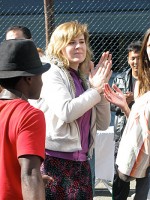Column Name
Title
Abby Gerdts never imagined where her life would take her.
Body
A member of Group 33 in the Drama Division, she was frequently lauded for her talent and compared to Laura Linney. It was assumed that her career trajectory would take her to New York’s stages and then to Hollywood.
However, Gerdts has never followed a traditional path. “When my teacher in high school told me to audition for Juilliard, I thought ‘Yeah, I guess I’ll audition,’” she said. “I’ve been doing this all my life. I just say yes—a gut instinctual yes—to things and then see what happens.”
In Gerdts’s case, saying yes led to her getting involved with ARTReach, a student-run Juilliard organization that helps expose at-risk children to the arts. When ARTReach linked up with ASTEP—Artists Striving to End Poverty—Gerdts continued to stay involved and became a programmer for ASTEP’s arts camps in South Africa and India.
“I’ve always wanted to be a part of something greater than myself,” Gerdts said. While being a pastor’s daughter has contributed to her desire to help others, Gerdts attributes her willingness to be involved in arts programming for disadvantaged kids to her time at Juilliard.
“I really, truly feel that the training I’ve received has helped me in almost every aspect of my life, particularly with this work because just saying yes to things—this lesson I learned cerebrally at Juilliard but now am putting it to practice in my life.”
Gerdts’s teaching background, developed through her involvement with ASTEP, led her to a Juilliard alum in Turkey, who invited her to set up programming at an elite school in Istanbul. It was there that Gerdts began volunteering with the U.N.H.C.R.—the United Nations refugee agency—with a focus on children of refugees. Many of the children Gerdts works with are from Congo, Afghanistan, Sudan, and Guinea—all deeply troubled countries.
“These children just need something to keep them safe and keep their brains stimulated,” Gerdts said. “Sometimes all they know are atrocious events. They’ve never talked to anyone that’s said that it wasn’t right for their parents and families to be killed.”
Along with other volunteers, Gerdts has helped set up a schooling system of sorts for these children, many of whom have had to stop their education midway through or have never had any formal schooling.
Not surprisingly, the circumstances that the refugee children face are unpredictable and their lives are in a continual state of flux. “You walk in and you never know if something overnight has changed drastically in a child and situation,” Gerdts said. “The child may not be there, may have been deported. You learn to not expect that anything will be the same; you constantly have to let go, re-evaluate, and then check your course again.”
Gerdts said that she learned how to be flexible at Juilliard. “It was a place where even if you went in prepared, you were always challenged. The staff and faculty were always asking you to stay on your toes. You have … to refocus quickly—that’s what it takes to be a great artist and also what it takes to be a good facilitator in the refugee camps, in what can be potentially dangerous situations.”
Frequently, through music and drama, Gerdts tries to get the children to tell their stories.
“Learning these plays and creating this music is such a relief for them,” she said. “It is an opportunity for them to tell their stories in a safe place, to be able to speak and to have someone listen—that’s important for them.”
When asked about where she sees herself going personally and artistically, Gerdts responded, “I’m just going to keep saying yes to things. I’ve been involved in so much—I’m still working with ASTEP. In Istanbul I’ve translated a children’s book, done voice-overs, directed and acted in plays.”
However, her work with the U.N.H.C.R. seems to resonate most with her. Learning about the lives of the refugees has made Gerdts realize the importance and value of what she is doing. Despite constant promises to her family and friends to return to the United States, she finds it difficult to distance herself from her work.
“The more you are witness to these stories, the harder it is to remove yourself—there is so much work to be done. I do it for selfish reasons—it is motivating to me. I want to be a part of something that is worthwhile. When I look back at my life I want to be able to say, ‘I think I was part of something that helped heal the world in a big way.’”





